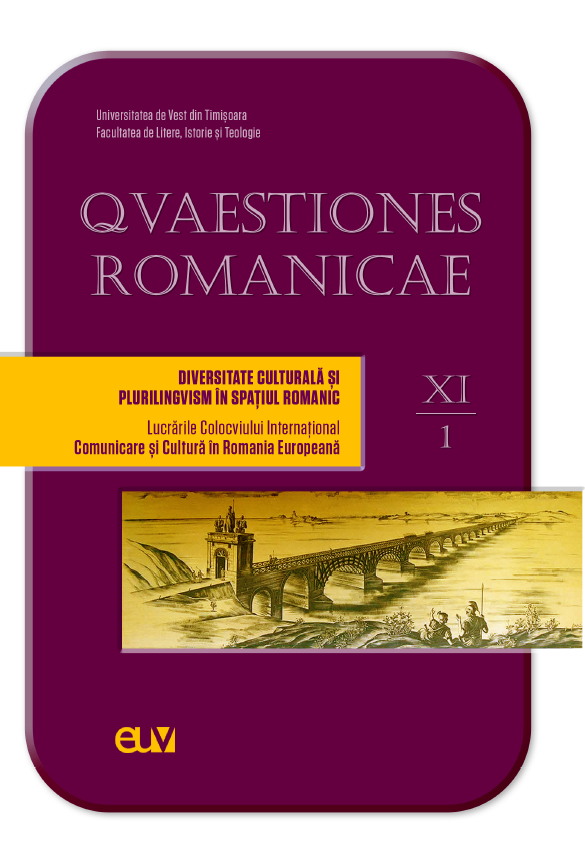La relation dialogique entre l’Ici et l’Ailleurs : la stratification culturelle de l’espace. Étude de cas : Le dernier roi d’Angkor de Jean-Luc Coatalem
Abstract: (The dialogical relation between the Here and the Elsewhere: the cultural stratification of the space. A case study: Le dernier roi d’Angkor by Jean-Luc Coatalem) Overcoming the limitations imposed by the territorial distance between a homeland (the Here) and an unknown destination (the Elsewhere), the travel succeeds in bringing together the two geographical points that meet, symbolically, through the cultural interferences resulting from this immersive experience. Whether it is wanted, planned, organized, or imposed, required by a historico-political context harmful to the traveler (exile, expatriation), the traveler engages on the road of the Elsewhere that he is going to discover by his infiltration in the space. To the collision with the Other and his space answers, on an individual level, the activation of the mechanism of cultural appropriation. Thus, the perceptive conscience of the individual will analyze and internalize this experience by the creation of a dialogical relation between the new space and his homeland. And from this polarization of the discourse between the Here and the Elsewhere, apparently without any connection, will result a cultural interference which enriches both the traveler and the space. Taking this axiology as a starting point, our analysis proposes the examination of the space as a living organism that encompasses a socio-cultural stratification, indisputable proof of multiple exchanges that occur through the cultural and civilizational contact between different nations. To certify the legitimacy of our assertions, we will apply these critical considerations to the novel Le dernier roi d’Angkor [The last king of Angkor] (Jean-Luc Coatalem) where France becomes the material representation of cultural diversity and civilizational contact due to its boundaries opened to immigrants from former French colonies. The central character Bouk is going to substitute his native country with France where he is going to take root definitively, thus contributing to the cultural diversity of this space.
Keywords: Jean-Luc Coatalem, cultural dialogue, France, immigration, acculturation.
Résumé : Dépassant les limitations imposées par la distance territoriale entre un espace natal (Ici) et un espace-destination inconnu (Ailleurs), le voyage réussit à rapprocher les deux points géographiques qui se rencontrent, symboliquement, par les interférences culturelles issues de cette expérience immersive. Qu’il soit voulu, programmé, organisé ou bien imposé, exigé par un contexte historico-politique néfaste (exil, expatriation), le voyageur s’engage sur la route de l’Ailleurs qu’il va découvrir par son infiltration dans l’espace. À la collision avec l’Autre et son espace répond, sur le plan individuel, l’activation d’un mécanisme d’appropriation culturelle. C’est ainsi que la conscience perceptive de l’individu va analyser et intérioriser cette expérience par la création d’une relation dialogique entre le nouvel espace et sa terre d’origine. Et de cette polarisation du discours entre un Ici et un Ailleurs, apparemment sans aucune connexion, résultera une interférence culturelle qui enrichit tantôt le voyageur, tantôt l’espace. Prenant comme point de départ cette axiologie, notre analyse se propose une décortication de l’espace en tant qu’organisme vivant qui englobe une stratification socio-culturelle, preuve incontestable de multiples échanges qui se produisent par le contact culturel et civilisationnel entre différentes nations. Pour certifier la légitimité de nos assertions, nous allons appliquer ces considérations critiques sur le roman Le dernier roi d’Angkor (Jean-Luc Coatalem) où la France devient la représentation matérielle de la diversité culturelle et du contact civilisationnel par son ouverture aux immigrants venus des anciennes colonies françaises. Le personnage central, Bouk, va substituer son pays natal avec la France où il va s’enraciner définitivement, contribuant ainsi à la diversité culturelle de cet espace.
Mots-clés : Jean-Luc Coatalem, dialogue culturel, France, immigration, acculturation.
